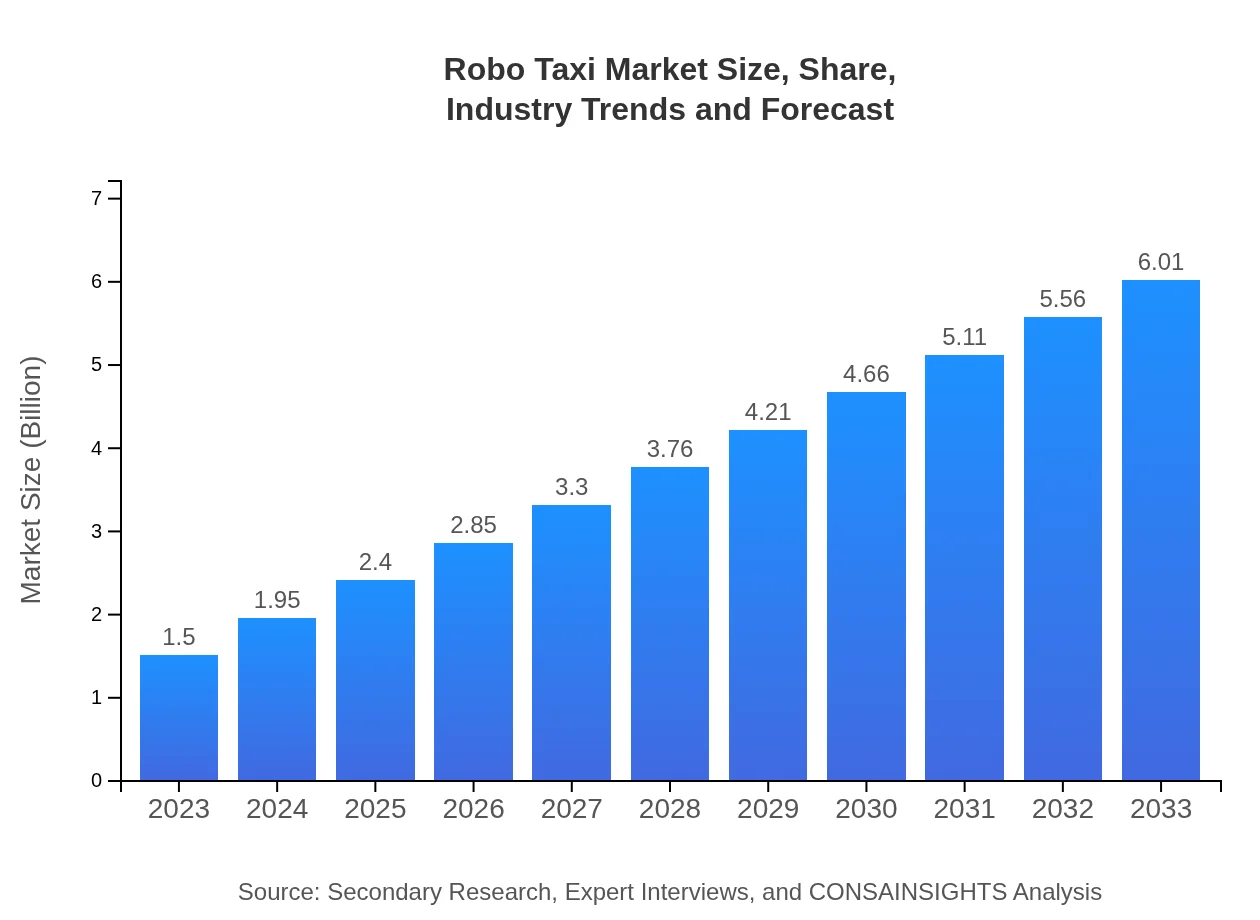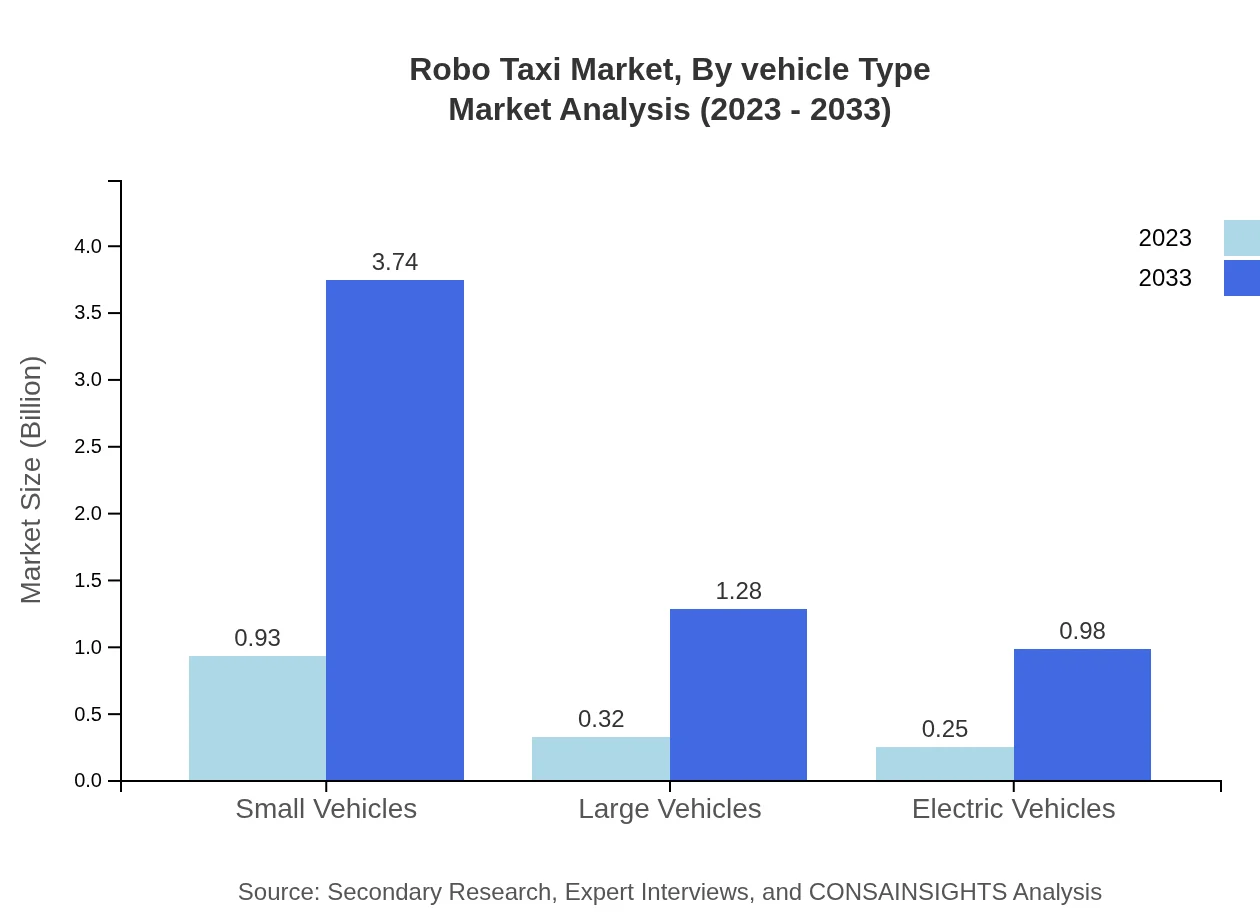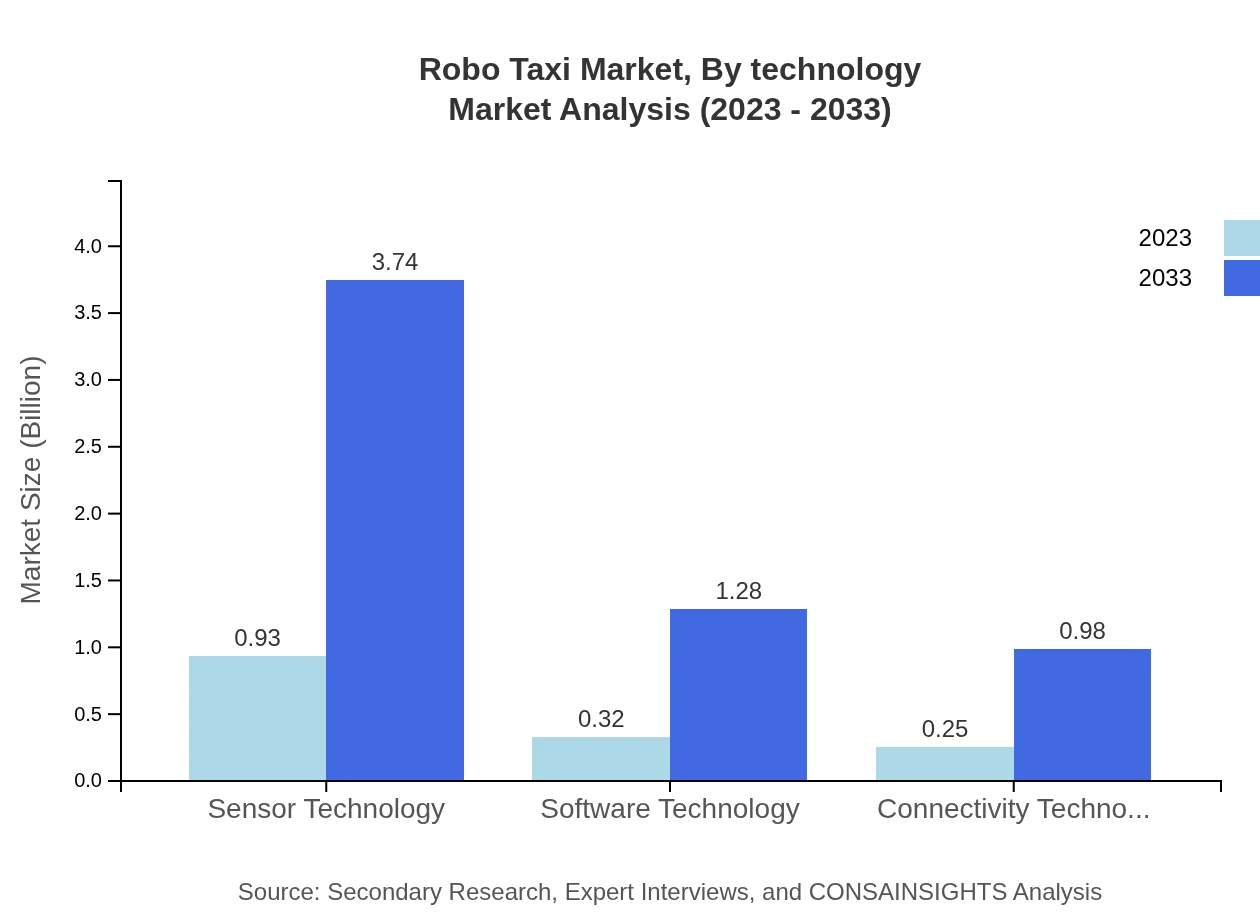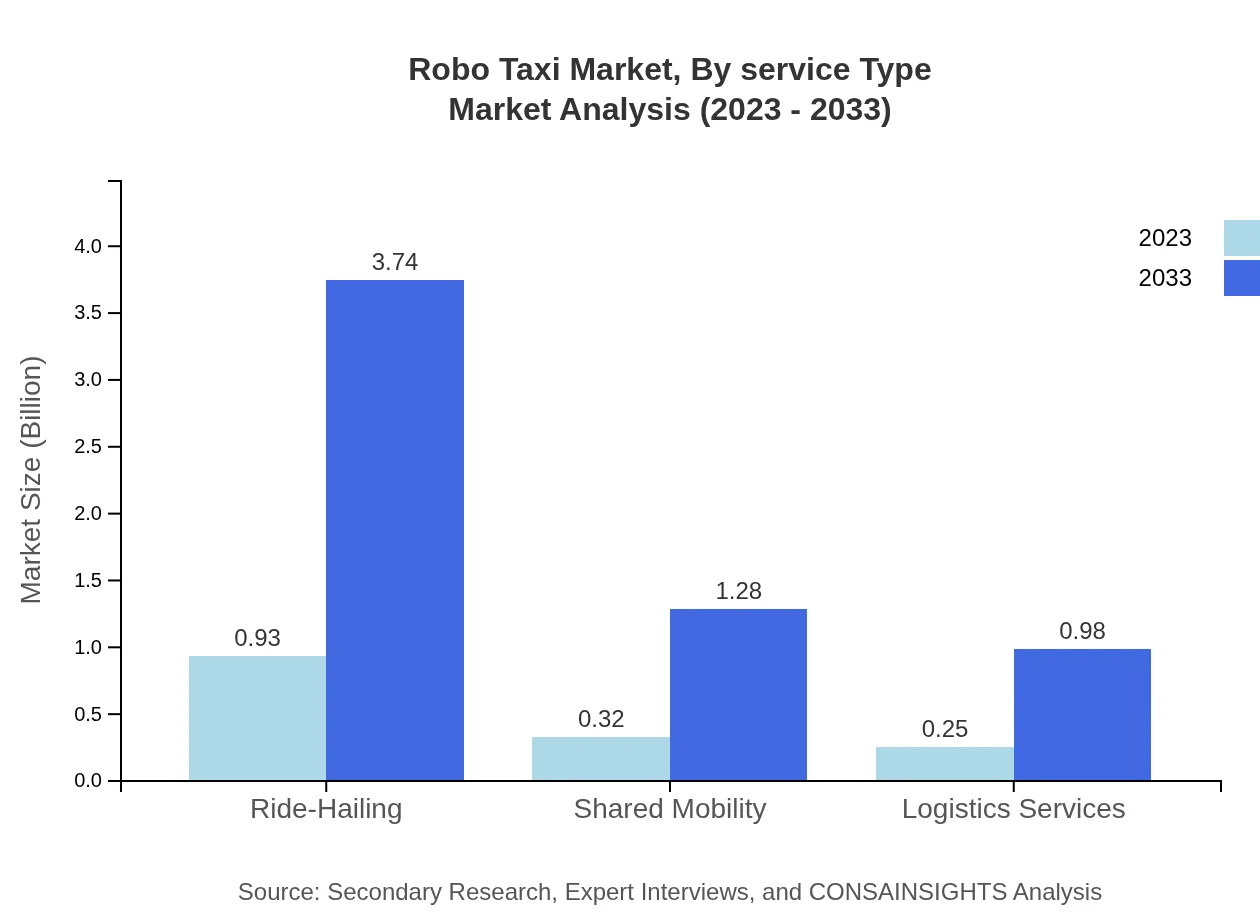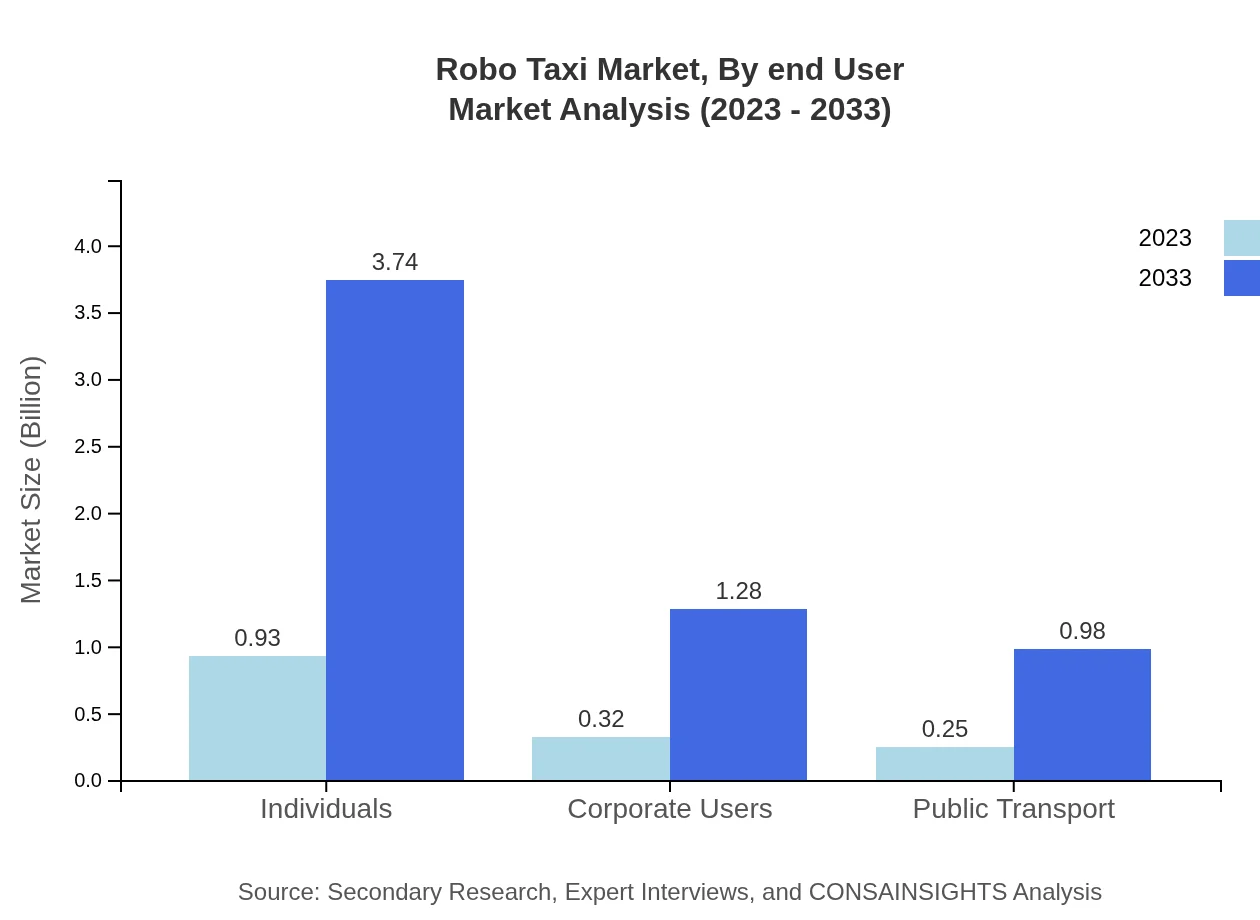Robo Taxi Market Report
Published Date: 02 February 2026 | Report Code: robo-taxi
Robo Taxi Market Size, Share, Industry Trends and Forecast to 2033
This report provides a comprehensive analysis of the Robo Taxi market from 2023 to 2033, including insights on market size, growth forecasts, industry trends, regional analysis, and key players. It aims to equip stakeholders with valuable data for strategic decision-making.
| Metric | Value |
|---|---|
| Study Period | 2023 - 2033 |
| 2023 Market Size | $1.50 Billion |
| CAGR (2023-2033) | 14.2% |
| 2033 Market Size | $6.01 Billion |
| Top Companies | Waymo, Uber ATG (Advanced Technologies Group), Baidu Apollo, Lyft Level 5, Zoox |
| Last Modified Date | 02 February 2026 |
Robo Taxi Market Overview
Customize Robo Taxi Market Report market research report
- ✔ Get in-depth analysis of Robo Taxi market size, growth, and forecasts.
- ✔ Understand Robo Taxi's regional dynamics and industry-specific trends.
- ✔ Identify potential applications, end-user demand, and growth segments in Robo Taxi
What is the Market Size & CAGR of Robo Taxi market in 2023 and 2033?
Robo Taxi Industry Analysis
Robo Taxi Market Segmentation and Scope
Tell us your focus area and get a customized research report.
Robo Taxi Market Analysis Report by Region
Europe Robo Taxi Market Report:
Europe's Robo Taxi market size is set to increase from $0.41 billion in 2023 to $1.63 billion by 2033. Regulatory support and commitment to green transportation models are enhancing the deployment of Robo Taxis across countries like Germany, France, and the UK, all of which are actively testing and implementing autonomous vehicle technologies.Asia Pacific Robo Taxi Market Report:
In 2023, the Asia Pacific Robo Taxi market is valued at $0.30 billion, projected to reach $1.21 billion by 2033. This growth is driven by rapid urbanization, adoption of smart mobility solutions, and technological advancements. Countries like China, Japan, and South Korea are leading the charge with substantial investments in AI and infrastructure development.North America Robo Taxi Market Report:
Expected to scale from $0.52 billion in 2023 to $2.07 billion by 2033, the North American market is poised for substantial growth due to high investments from companies like Waymo and Uber in technology development and operations. The regulatory landscape is gradually becoming more favorable, facilitating quicker adoption rates.South America Robo Taxi Market Report:
The South American market will grow from $0.12 billion in 2023 to $0.47 billion by 2033. The market is gradually picking up momentum as cities like São Paulo and Buenos Aires begin pilot programs. Increasing interest in modern transportation solutions is crucial for growth, though regulation and infrastructure challenges persist.Middle East & Africa Robo Taxi Market Report:
The market in the Middle East and Africa is anticipated to grow from $0.16 billion in 2023 to $0.64 billion by 2033. Demand for improved urban transport solutions in cities such as Dubai and Cape Town, alongside increased investments in smart city initiatives, are pivotal in driving this market.Tell us your focus area and get a customized research report.
Robo Taxi Market Analysis By Vehicle Type
The vehicle type segment reveals that small vehicles will dominate, driven by consumer preference for shared mobility services, followed closely by large vehicles aimed at corporate and logistical usages. In 2023, small vehicles will hold a market size of approximately $0.93 billion, jumping to $3.74 billion by 2033. Large vehicles, while less dominant, show promise in specific applications, growing from $0.32 billion to $1.28 billion.
Robo Taxi Market Analysis By Technology
Technological advancements significantly influence the Robo Taxi market, particularly sensor and software technologies. Sensor technology holds a critical 62.25% share, which is vital for the safe operation of autonomous vehicles. Meanwhile, software technology, comprising 21.37% market share, facilitates operational management. Market size for sensor technology will expand from $0.93 billion in 2023 to $3.74 billion by 2033, highlighting its paramount importance in this field.
Robo Taxi Market Analysis By Service Type
Ride-hailing services constitute the majority of the market share at 62.25% in 2023, foreseen to grow as urban mobility continues transitioning toward on-demand services. Other service types like shared mobility maintain a vital part of the market, moving from $0.32 billion to $1.28 billion in the same timeframe.
Robo Taxi Market Analysis By End User
Individuals will remain the primary end-users of Robo Taxi services, accounting for 62.25% in both 2023 and 2033. This dominance is attributed to increasing consumer acceptance and preference for hassle-free transport solutions. Corporate users also form a significant customer base, with their market size expanding dramatically due to rising demand for employee transport and business logistics.
Robo Taxi Market Trends and Future Forecast
Tell us your focus area and get a customized research report.
Global Market Leaders and Top Companies in Robo Taxi Industry
Waymo:
A leader in autonomous driving technology, Waymo specializes in developing Robo Taxi services and operates in various test cities. They focus on safety and efficiency in their driverless cars.Uber ATG (Advanced Technologies Group):
Uber's ATG is dedicated to creating self-driving cars and Robo Taxi services aimed at enhancing the user experience while navigating regulatory challenges.Baidu Apollo:
Baidu’s Apollo project encompasses an open platform for autonomous driving, promoting the development of Robo Taxi technologies across different urban environments.Lyft Level 5:
Lyft's Level 5 division focuses on building self-driving technology to enhance its existing ride-sharing platform, advancing towards Robo Taxi implementation.Zoox:
Acquired by Amazon, Zoox specializes in designing autonomous vehicles specifically for ride-sharing services, featuring unique designs tailored for urban mobility.We're grateful to work with incredible clients.









FAQs
What is the market size of Robo-Taxi?
The global Robo-Taxi market is currently valued at $1.5 Billion in 2023, with an impressive projected CAGR of 14.2% over the next decade. This growth reflects an increasing demand for autonomous vehicle services.
What are the key market players or companies in the Robo-Taxi industry?
Key players in the Robo-Taxi market include major tech companies and traditional automotive manufacturers that are investing in autonomous technologies. Notable companies are Waymo, Uber, Tesla, and various start-ups focusing on driverless technology.
What are the primary factors driving the growth in the Robo-Taxi industry?
Growth in the Robo-Taxi industry is driven by advancements in autonomous vehicle technology, increasing urbanization leading to higher demand for ride-sharing services, government support by way of funding and regulations, and a focus on reducing traffic congestion.
Which region is the fastest Growing in the Robo-Taxi market?
North America is the fastest-growing region in the Robo-Taxi market, projected to expand from $0.52 billion in 2023 to $2.07 billion in 2033. Europe and Asia Pacific are also emerging, showcasing robust growth opportunities in the coming years.
Does Consainsights provide customized market report data for the Robo-Taxi industry?
Yes, Consainsights offers tailored market report data for the Robo-Taxi industry, allowing clients to obtain specific insights according to their business needs, including customized market analytics and segmented reports.
What deliverables can I expect from this Robo-Taxi market research project?
Deliverables from the Robo-Taxi market research project include comprehensive market analysis reports, forecasts, regional studies, competitive landscape assessments, and recommendations based on the most recent market trends and insights.
What are the market trends of Robo-Taxi?
Market trends in the Robo-Taxi sector indicate a shift towards increased adoption of electric vehicles, development of integrated mobility solutions, enhancements in sensor and connectivity technology, and a growing preference for shared mobility options.

